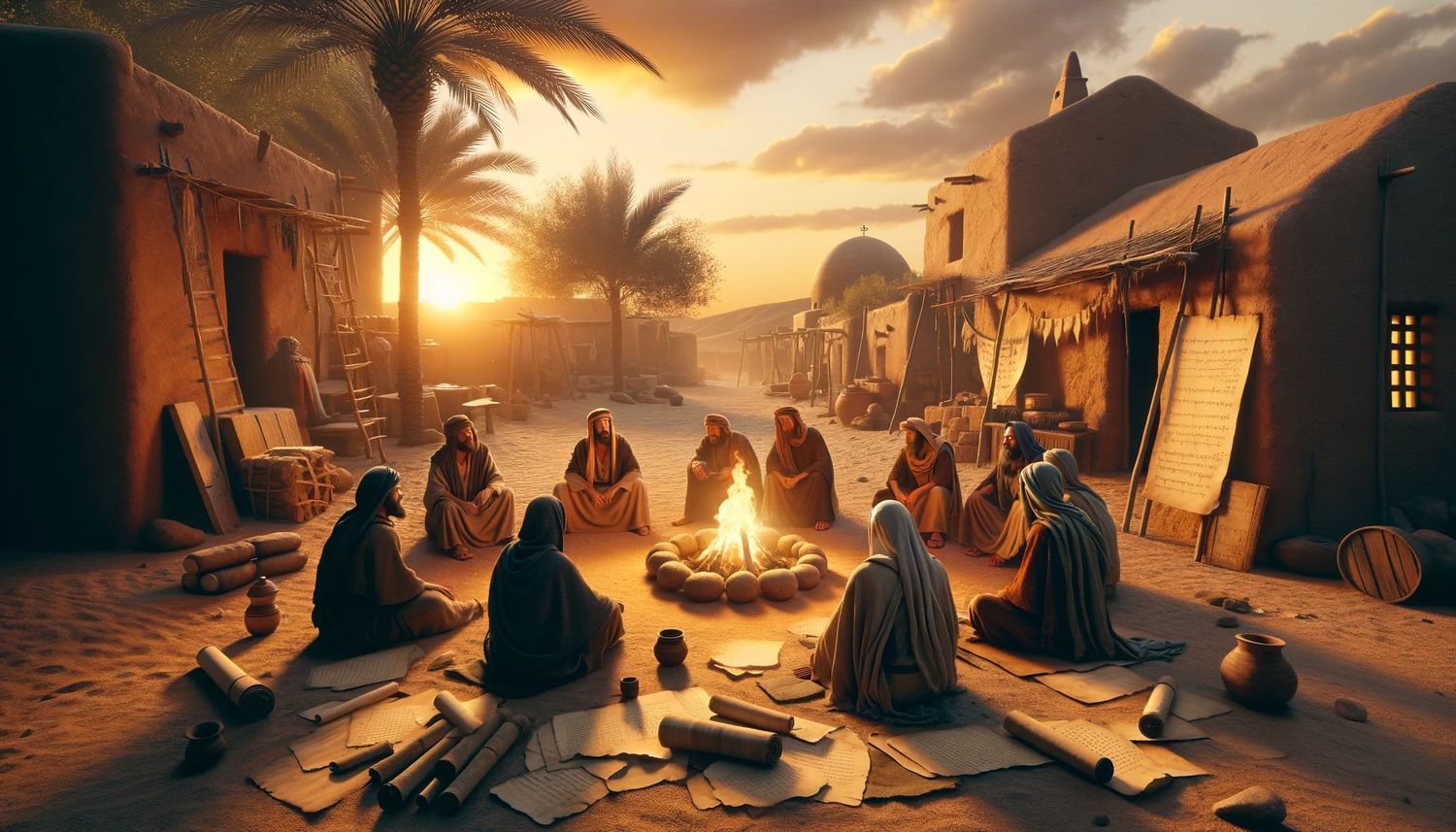Home>Christian Videos>Bible Stories>How Does The Quran View The Jewish Torah And The Christian Gospels?


Bible Stories
How Does The Quran View The Jewish Torah And The Christian Gospels?
Published: March 7, 2024
Ericka Andersen, an editor at Christian.net, expertly merges digital strategy with content creation, focusing on faith and societal issues. Her communication skills enhance the platform's engaging narratives, fostering meaningful dialogue on belief's impact on society.
Discover how the Quran interprets the Jewish Torah and Christian Gospels in relation to Bible stories. Explore the perspectives and insights within Islamic teachings.
(Many of the links in this article redirect to a specific reviewed product. Your purchase of these products through affiliate links helps to generate commission for Christian.net, at no extra cost. Learn more)
Table of Contents
Introduction
How does the Quran view the Jewish Torah and the Christian Gospels? This is a question that has sparked curiosity and debate among scholars, theologians, and followers of these Abrahamic religions. The Quran, the holy book of Islam, holds a significant place in the lives of Muslims around the world. It is believed to be the word of God as revealed to the Prophet Muhammad. Understanding the Quran's perspective on the Torah and the Gospels is crucial in comprehending the relationships between Islam, Judaism, and Christianity. Let's delve into the Quran's viewpoint on these sacred texts and explore the similarities and differences it presents.
Read more: What Does The Quran Say About Jesus Christ
The Quran's Perspective on the Jewish Torah
The Quran acknowledges the Jewish Torah as a sacred scripture revealed to Prophet Moses. It respects the Torah as a source of guidance and wisdom for the Jewish people. In several verses, the Quran refers to the Torah as a book of truth and light, emphasizing the importance of its teachings. Muslims are encouraged to believe in the divine origin of the Torah and to honor its role in shaping the faith of the Jewish community. The Quran also highlights the stories of the prophets mentioned in the Torah, such as Adam, Noah, Abraham, Moses, and others, portraying them as exemplary figures whose lives exemplify steadfast faith and devotion to God. This recognition of the Torah in the Quran underscores the interconnectedness of the Abrahamic faiths and promotes a sense of mutual respect and understanding among followers of different religious traditions.
- The Quran acknowledges the Torah as a sacred scripture revealed to Prophet Moses.
- It respects the Torah as a source of guidance and wisdom for the Jewish people.
- The Quran refers to the Torah as a book of truth and light, emphasizing the importance of its teachings.
- Muslims are encouraged to believe in the divine origin of the Torah and to honor its role in shaping the faith of the Jewish community.
- The Quran highlights the stories of the prophets mentioned in the Torah, portraying them as exemplary figures whose lives exemplify steadfast faith and devotion to God.
The Quran's Perspective on the Christian Gospels
The Quran holds the Christian Gospels, including the Injeel (Gospel) revealed to Prophet Jesus, in high regard. It recognizes the Gospels as a significant part of the divine revelation and acknowledges the role of Jesus as a revered prophet in Islam. The Quran emphasizes the ethical and moral teachings present in the Gospels, encouraging Muslims to uphold the virtues and principles espoused by Jesus. While affirming the divine origin of the Gospels, the Quran also addresses theological differences, particularly the concept of the Trinity, asserting the oneness of God. Despite these disparities, the Quran underscores the commonalities between Islam and Christianity, emphasizing the shared values of compassion, justice, and devotion to God. It promotes a spirit of harmony and mutual understanding, fostering respect for the Christian faith and its scriptures among Muslims.
- The Quran holds the Christian Gospels, including the Injeel (Gospel) revealed to Prophet Jesus, in high regard.
- It recognizes the Gospels as a significant part of the divine revelation and acknowledges the role of Jesus as a revered prophet in Islam.
- The Quran emphasizes the ethical and moral teachings present in the Gospels, encouraging Muslims to uphold the virtues and principles espoused by Jesus.
- While affirming the divine origin of the Gospels, the Quran also addresses theological differences, particularly the concept of the Trinity, asserting the oneness of God.
- The Quran underscores the commonalities between Islam and Christianity, emphasizing the shared values of compassion, justice, and devotion to God.
A Comparison of the Quran, Torah, and Gospels
The Quran, Torah, and Gospels, revered as divine scriptures in Islam, Judaism, and Christianity respectively, share commonalities while also exhibiting distinct perspectives and teachings. Understanding the similarities and differences among these sacred texts is essential in fostering interfaith dialogue and promoting mutual respect among followers of these Abrahamic faiths.
Similarities
- Monotheism: All three scriptures emphasize the belief in the oneness of God, underscoring monotheism as a fundamental tenet of the Abrahamic faiths.
- Prophetic Tradition: The Quran, Torah, and Gospels feature accounts of various prophets, conveying moral guidance and divine revelations to their respective communities. The stories of prophets such as Abraham, Moses, and Jesus are shared across these scriptures, illustrating their significance in the Abrahamic tradition.
- Ethical Principles: Each of these scriptures advocates for ethical conduct, emphasizing virtues such as compassion, justice, and righteousness as integral to leading a virtuous life.
Read more: How Many Of The Apostles Were Jewish
Differences
- Revelatory Context: While the Quran is believed to be the final and complete revelation, superseding previous scriptures, the Torah and the Gospels are viewed within their specific historical and prophetic contexts, with the Quran providing guidance for interpreting and understanding their messages.
- Theological Concepts: Variations in theological doctrines, such as the concept of the Trinity in Christianity, distinguish the Quran from the Gospels, reflecting divergent theological interpretations and beliefs.
- Legal and Ritual Practices: The Quran, Torah, and Gospels prescribe distinct legal and ritual practices for their respective communities, reflecting the unique religious laws and traditions upheld within Islam, Judaism, and Christianity.
Interconnectedness
Despite these disparities, the Quran acknowledges the divine origins of the Torah and the Gospels, affirming their significance in shaping the religious consciousness of their adherents. It encourages Muslims to respect and honor the sacred status of these scriptures, fostering an environment of understanding and coexistence among followers of different faith traditions.
In essence, the Quran, Torah, and Gospels, while embodying distinct theological and historical contexts, converge in their advocacy for monotheism, ethical conduct, and reverence for the prophetic tradition, serving as foundational sources of spiritual guidance and moral wisdom for millions of believers worldwide.
Conclusion
In conclusion, the Quran's perspective on the Jewish Torah and the Christian Gospels reflects a stance of reverence, recognition, and interconnectedness. The Quran acknowledges the divine origins of these scriptures, emphasizing their role as sources of guidance and wisdom for their respective communities. While delineating theological disparities, the Quran underscores the shared values and ethical principles advocated by the Torah and the Gospels, promoting a spirit of mutual respect and understanding among followers of Islam, Judaism, and Christianity. This inclusive outlook aligns with the Quran's emphasis on fostering harmonious relations and upholding the principles of compassion, justice, and monotheism. By recognizing the significance of the Torah and the Gospels, the Quran contributes to the dialogue and mutual appreciation among the Abrahamic faiths, fostering a climate of coexistence and respect in the diverse tapestry of religious beliefs.














